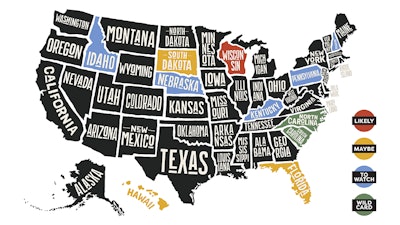
While four states took giant leaps on the cannabis legalization front in 2023—including Delaware, Kentucky, Minnesota and Ohio—a host of others have unfinished business lingering for 2024.
Here at Cannabis Business Times, we’ve once again consulted with our crystal ball to determine the possibility of changing fortunes for 11 states on our legalization radar. This list includes five states that could finally take up medical cannabis legalization and another six that might make the jump to adult-use legalization.
In addition, four states on our list—Florida, Idaho, Nebraska and South Dakota—currently have campaigns aiming to put legalization questions before their voters in the November 2024 election, while the other seven states do not provide for citizen-initiated ballot measures, meaning it’s up to state legislators to effectuate change that is supported by the majority of Americans.
Speaking about this majority, more than 52% of U.S. residents now live in a state where adult-use cannabis is legal after Ohio became the 24th to end its prohibition policies in the 2023 election. Yet the majority doesn’t always rule, even in a representative democracy, where federal policies on cannabis have yet to align with the electorate.
Putting the legislative branch aside, there’s optimism in 2024 for the executive branch to implement incremental reform via the Department of Justice, where the Drug Enforcement Administration is now reviewing a recommendation from the Department of Health and Human Services to reclassify cannabis as a Schedule III drug.
Will this acknowledgement of cannabis’s medicinal values be enough to influence state-level policies from some of our nation’s last holdouts? We’re sure hoping to find out!
In the meantime, we hope you enjoy reading our annual legalization forecast that includes states that are likely to legalize, states that might legalize, states “to watch” closely for signs of legalization, and wild cards—where surprises await in legislative sessions.
Do you see things differently? Reach out. Connect. Share. Let us know.
Likely
Wisconsin

Wisconsin is one of the lead contenders to legalize medical cannabis in 2024 despite having a Democratic governor and Republican lawmakers who have locked horns on the issue in recent years.
While Gov. Tony Evers, who has held office since 2019, has pushed for adult-use cannabis legalization via his state budget proposals in past years, he said in early January that he’s willing to get on board with a more limited medical cannabis program being proposed by Republicans who have held majorities in the state Assembly and Senate since 2011.
Rep. Jon Plumer took the lead in unveiling the Assembly Republicans’ plan during a press conference Jan. 8, when the specifics of a state-run program that would initially allow for five stores to sell non-smokable cannabis products came to light. The retail facilities would operate under the state’s Department of Health Services and require state-employed pharmacists for dispensing.
“Pretty much for the last six, eight months we’ve really been digging into medical [cannabis] here in Wisconsin,” Plumer said. “We’ve come up with a program I think is going to be very beneficial to a lot of Wisconsinites.”
The proposal would allow for independent businesses to cultivate and process medical cannabis with licensure and regulation under the state Department of Agriculture, Trade and Consumer Protection.
Proposed qualifying conditions for patients to access non-smokable cannabis—such as oils, tinctures, edibles and topicals—include Alzheimer’s disease, cancer, chronic nausea, chronic pain, epilepsy, glaucoma, inflammatory bowel disease, multiple sclerosis, muscle spasms, post-traumatic stress disorder, and terminal illnesses where a person’s life expectancy is less than one year.
While Assembly Speaker Robin Vos, R-Rochester, said he won’t budge on amending the proposed bill, a compromise appears necessary to move forward after Senate Majority Leader Devin LeMahieu, R-Oostburg, said that creating state-run dispensaries was a “nonstarter” for several caucus members in his chamber, The Associated Press reported.
Still, Wisconsin gets a “likely” to legalize in 2024 nod from the team at CBT with two of three government pillars—the Assembly and governor—on board to start the year.
While the Assembly GOP’s limited medical plan falls short of Evers’ vision to legalize and tax adult-use cannabis like alcohol, the Democratic executive appears ready to relent.
“I would think that getting it all done in one fell swoop would be more thoughtful as far as meeting the needs of Wisconsinites that have asked for it,” Evers said. “But if that’s what we can accomplish right now, I’ll be supportive of that.”
In October 2022, pollsters from Marquette University Law School found that 64% of Wisconsin voters supported adult-use legalization.
Currently, Wisconsin is one of nine states in the nation absent of even a restrictive medical cannabis program despite bordering three adult-use states and one medical-only state. And as one of 24 states that does not provide for citizen-initiated ballot measures, cannabis reform in Wisconsin must have the backing of the Legislature.
Although Wisconsin’s 2024 legislative session is scheduled Jan. 16 to March 14, there is no session length limit imposed: Wisconsin has full-time legislators who can meet throughout the year after adjourning.
-Tony Lange, Associate Editor
Maybe
Florida

Florida has more than $40 million in financial clout behind an adult-use cannabis legalization initiative, but will that be enough to land on the November 2024 ballot?
Despite Tallahassee-based multistate cannabis operator Trulieve, which has 131 dispensaries in Florida, paying the bills for Smart & Safe Florida’s legalization campaign, that question is now in the hands of the Florida Supreme Court, which is currently weighing the merits of the proposed constitutional amendment.
As part of the normal judicial review process, the state’s top justices must determine if the ballot language is clear and concise in a manner that does not mislead voters and if the proposed constitutional amendment embraces no more than one subject matter.
The court’s justices heard oral arguments on the proposed ballot measure in November, notably after Attorney General Ashley Moody filed a four-part argument against allowing the measure to go before voters.
While it is unclear exactly when the Supreme Court will issue a final ruling on the challenge to the ballot language, the judicial body has until April 1 to hand down a decision. However, if the court does not release a ruling by then, the measure would be cleared for the ballot.
It’s important to note that the state’s justices ruled in 5-2 decisions that a pair of previous attempts to legalize adult-use cannabis via the 2022 election were misleading to voters and not sufficient to appear on the ballot. Four of the five justices in that majority are still on the bench.
Key provisions in the proposed 2024 constitutional amendment include allowing:
- existing medical operators to remain vertically integrated while expanding to a forthcoming adult-use market;
- the state Legislature to determine a process for licensing additional market entrants; and
- adults 21 and older to purchase and possess up to 3 ounces of dried flower or 5 grams of concentrate for personal use.
Should Smart & Safe Florida’s 2024 proposal land on the ballot, it would need a 60% supermajority vote of approval to pass, a threshold that was approved by the state’s voters in 2006. This supermajority threshold doomed Florida’s first attempt at legalizing medical cannabis in the 2014 election, despite 57.6% of voters supporting Amendment 2.
Today, roughly two-thirds (67%) of Florida voters say they would support a constitutional amendment allowing adults to purchase and possess personal amounts of cannabis, according to a November 2023 survey conducted by pollsters at the University of North Florida’s Public Opinion Research Lab. Only 28% of those surveyed said they’d vote against it.
While this poll is promising for legalization advocates, myriad factors can influence voters during an actual election. Only one of the 13 states to legalize adult-use cannabis via citizen-initiated ballot measures has hit that 60% approval mark on Election Day: Arizona in 2020.
-Lange
Hawaii

Hawaii remains the oldest medical-only cannabis market in the U.S. that has yet to expand to adult-use legalization, but 2024 could change all that.
Although Hawaii was the sixth state in the nation to legalize medical cannabis in 2000—and the first to do so via legislature—it fell behind many of its reform peers during Democrat David Ige’s governorship from 2014-2022. While Ige opposed legalization, his successor, Gov. Joshua Green, said he’d support an adult-use cannabis program a month before his election.
In turn, the Hawaii Senate overwhelmingly approved an adult-use legalization bill via a 22-3 vote in March 2023, but that victory for reform advocates was short-lived. The bill collided with a roadblock in the House, where Speaker Scott Saiki said he wanted to wait until the summer (after the legislative session) to advance discussions on legalization.
While Saiki said he wanted more time to come up with a comprehensive bill that addressed concerns over federal restrictions and law enforcement, his proposed discussions never materialized last summer.
Now with a new legislative session under way in 2024—with a projected end date of May 2—adult-use cannabis legalization remains a legislative priority for Hawaii’s Senate; however, the House did not reciprocate this on its priority list.
The legislative priorities for both chambers were released on the heels of state Attorney General Anne Lopez’s office sending lawmakers Jan. 5 a revised 315-page draft bill to legalize adult-use cannabis—much longer than the 56-page bill passed by the Senate in 2023.
While Lopez, a Democrat, said her department does not support legalizing adult-use cannabis, she recognized that reform is likely on the horizon. As such, her department’s focus was to provide legislators with legal concerns and the “significant risks to public safety and public health” should the Legislature approve adult-use cannabis legislation.
The 315-page draft bill was not an endorsement for legalization but rather intended to provide legislation that minimizes the perceived health risks of the department and to promote public welfare “to the greatest extent possible,” according to a press release by the attorney general.
“We acknowledge that with changing public perception in recent years, the odds that the Legislature may pass legislation legalizing adult-use cannabis have increased substantially,” Lopez said in the release. “Given that the Legislature could theoretically pass a bill as early as this year, it is my department’s duty to warn the Legislature of the risks, while simultaneously providing a framework that includes robust public-safety and public-health safeguards.”
But will the Legislature consider the attorney general’s draft legislation?
Perhaps the bigger question: Will it be enough to sway Saiki from removing himself as a roadblock in the House?
As the old saying goes, time will tell.
-Lange
South Dakota

South Dakota has tried time and time again to legalize adult-use cannabis, including several legislative attempts in Pierre as well as ballot initiatives in the 2020 and 2022 elections. Will 2024 finally be the year that the Mount Rushmore State joins the ranks of 24 others in the U.S.?
Rewind to the November 2020 election—South Dakota made history when voters approved medical and adult-use cannabis legalization on the same ballot.
The adult-use victory was short-lived, however; the Supreme Court struck down the measure as unconstitutional in November 2021, ruling that the initiative violated the single-subject rule of the South Dakota Constitution.
Adult-use legalization bills in the statehouse have since come and gone, and advocates worked tirelessly to get another adult-use ballot measure before voters in the November 2022 election, when voters rejected the initiative, 53% to 47%.
South Dakotans for Better Marijuana Laws is back at it this year, collecting signatures to get adult-use legalization on the ballot once again this November. The campaign must collect 17,508 valid signatures by May 7 to qualify for the Nov. 5 ballot.
“Happy New Year! Thank you all for your unwavering support throughout the years,” the campaign wrote on Facebook Jan. 1. “We have had many highs and lows while fighting for cannabis legalization and we greatly appreciate everyone who has donated their time and energy to the fight year after year.”
-Melissa Schiller, Senior Digital Editor
To Watch
Idaho

One of only a handful of remaining states that still prohibits cannabis for medical and adult use, Idaho could see a medical cannabis legalization measure on its 2024 ballot.
Political action committee Kind Idaho is currently gathering signatures to place The Idaho Medical Marijuana Act before voters in the Nov. 5 election. The group must collect at least 62,896 signatures by a May 1 deadline.
Kind Idaho worked in 2021 to place a similar initiative, the Idaho Medical Marijuana Act for 2022 (IMMA), on the state’s 2022 ballot but fell short on signatures.
In August 2021, Russ Belville, a spokesperson for the Idaho Citizens Coalition for Cannabis, which was working to collect signatures for an adult-use ballot initiative at the time, told Cannabis Business Times that Idaho is “the most hostile state” toward policy reform.
“In 2013, we had the Legislature pass a resolution that says marijuana should never be legalized in the state for any purpose,” Belville said. “They’ve put it on paper that they’re the most anti-marijuana Legislature in America.”
Kind Idaho Chair Jackee Winters told CBT during the group’s 2021 signature gathering efforts that it’s time for a change.
“It’s time for Idaho to grow up,” she said. “There are people here who suffer, and we’re behind the times.”
-Schiller
New Hampshire

New Hampshire, the only New England state that has not legalized adult-use cannabis, appears to be considering a state-run cannabis sales model that would be the first of its kind in the country.
A legislative commission tasked with studying a state-run model for adult-use sales completed its work in November but failed to issue an official recommendation on the matter.
Shortly after the commission wrapped up its analysis, Gov. Chris Sununu, who has served since 2017, said that a regulated adult-use market in the Granite State must have a limit of 15 stores, as well as a ban on lobbying and political contributions by cannabis licenses. The commission had initially discussed limiting the number of adult-use licensees to 67 to match the number of liquor stores in the state, and some were surprised by Sununu’s remarks.
Sen. Rebecca Whitley, D-Hopkinton, for example, told the New Hampshire Bulletin at the time that “it feels very rushed and a little inefficient to have spent months and months on this language, the various issues, and then the very last meeting, the very last half hour, to raise these pretty substantial issues.”
Legislative attempts to legalize adult-use cannabis have failed the past two years in New Hampshire.
In 2022, the House approved a legalization bill that would have allowed state-run liquor stores to serve the adult-use market, but the legislation stalled in the Senate.
During last year’s legislative session, the House once again passed a proposal to legalize adult-use cannabis in a non-state-run sales model, but the Senate again rejected the measure.
It remains to be seen whether a new proposal can make it through the statehouse this year—and whether Sununu will sign off on it.
In May, in the wake of the most recent adult-use legalization bill’s demise, Sununu issued a statement to signal his support for an adult-use cannabis market that is regulated similarly to how New Hampshire controls liquor sales.
“With the right policy and framework in place, I stand ready to sign a legalization bill that puts the State of NH in the driver’s seat, focusing on harm reduction—not profits,” he said. “Similar to our liquor sales, this path helps to keep substances away from kids by ensuring the State of New Hampshire retains control of marketing, sales, and distribution—eliminating any need for additional taxes. As such, the bill that was defeated in NH this session was not the right path for our state.”
-Schiller
Nebraska

Nebraska’s story is eerily similar to that of South Dakota—Nebraskans for Medical Marijuana met the signature requirements to place a medical cannabis legalization measure on the state’s 2020 ballot, but the Nebraska Supreme Court struck down the initiative before Election Day, ruling that it violated the single-subject rule outlined in the state constitution.
The campaign regrouped and tried again in 2022 but ultimately fell short on signatures.
Nebraskans for Medical Marijuana kicked off efforts for a 2024 ballot initiative in September, filing two separate statutory petitions. One would establish a doctor patient system and the other would regulate the medical cannabis industry. The campaign must collect roughly 87,000 signatures per petition by July 3 for the measures to land on the Nov. 5 ballot.
“There was never a question that we would come back for a third time,” Campaign Manager and advocate Crista Eggers said in a public statement. “This issue is not one we can give up on; it’s people’s lives we are fighting for. We started collecting earlier than we ever have, ensuring we have time on our side. We know that Nebraskans want to see this on the ballot, and we are going to do just that.”
In the Legislature, Sen. Anna Wishart, who also serves as the co-chair of Nebraskans for Medical Marijuana, has spearheaded efforts to legalize medical cannabis legislatively, although cannabis policy reform legislation has historically gained little traction in Lincoln.
Nonetheless, Nebraskans for Medical Marijuana is optimistic that 2024 is the year for change.
“We're confident that this time is different,” the campaign wrote in a Dec. 31 Facebook post. “We're off to an amazing start, but we still have a ways to go.”
-Schiller
Kentucky

Kentucky seems to be doing its own thing, as far as legalization efforts go. The state took an unconventional route toward medical cannabis legalization in 2023, by first decriminalizing the plant and pointing patients to neighboring states for sales, and now it’s back in the same position for a possible flip to adult-use.
State Rep. Nima Kulkarni, D-Louisville, has once again proposed a decriminalization measure that would allow law enforcement across the state simply to get on the same page—a prerequisite, perhaps, for a more straightforward tax-and-regulate plan like most other states. This latest iteration of Kulkarni’s plan landed in the statehouse in early January. “I’m hopeful we will be able to include these decriminalization provisions to make whatever that framework looks like just be fair for all Kentuckians,” Kulkarni said.
We’re not betting the farm on Kentucky getting even that bill across the finish line, much less adult-use legalization more broadly, but we’ve seen crazier things in this industry. Consider Kentucky a firm “To Watch.”
-Eric Sandy, Digital Editor
Pennsylvania

Pennsylvania is now (mostly) surrounded by states that have approved some form of adult-use legalization. And with Gov. Josh Shapiro’s support for the idea and the Democrat-controlled House throwing its weight behind reform efforts, the flip to adult-use in the Keystone State scans like a no-brainer.
Not so fast, though.
The Republican-led Senate has halted all attempts at passing an adult-use legalization bill.
Still, State Sens. Daniel McLaughlin and Sharif Street have their bipartisan bill sitting on the table, so there’s a starting point for Pennsylvania (isn’t there always?) in 2024. But even Democrats aren’t fully united behind McLaughlin and Street’s bill. It’s going to take some political maneuvering simply to earn a floor vote this year.
State Sen. Kim Ward, the party leader in the Senate, told Axios late last year that she won’t budge until the U.S. federal government makes a move. With some form of rescheduling cannabis in the offing (although who knows when that’ll happen?), she may be pushed into action.
“We have a unique and singular opportunity to correct decades of mass incarceration, disproportionate enforcement against marginalized communities, the criminalization of personal choice and the perpetuation of violence, which all materialized from the failed war on drugs,” Street said last year. “Legalizing the adult use of cannabis will help us fully and equitably fund education, lower property taxes, and address a variety of community needs throughout Pennsylvania.”
-Sandy
Wild Card
North Carolina

The Carolinas are rarely in the cannabis spotlight, although we can attest that there’s great interest in both states for news articles about legalization efforts—however few and far between.
North Carolina is sitting on a Senate-approved medical cannabis bill from 2023 (S.B. 3), meaning that the ball now rests in the House’s court. House Speaker Tim Moore wants a majority of the chamber’s members to support the bill before he’ll bring it to the floor for a vote, but there’s also the chance that he can be persuaded to drop that rule and let the bill have its day before lawmakers.
Until either of those things happen, no dice. News reports out of NC are few and far between in early 2024, but we’ll keep an ear to the ground on any movement in the House.
S.B. 3 would allow 10 companies to set up shop as vertically integrated operators.
-Sandy
South Carolina

South Carolina is perhaps even more interesting.
Although that doesn’t mean there’s much in the way of good news.
In 2022, State Sen. Tom Davis introduced S. 423 to legalize medical cannabis. Davis is a staunch supporter, and it seemed in the early reports that his effort had legs. The Senate went so far as to pass the bill. Unfortunately, he ran into a procedural roadblock in the House and returned to the drawing board.
He revived the bill in 2023 to local fanfare, but not much has happened. The bill has lingered in the Senate’s Medical Affairs Committee since last March.
“I think it is the most conservative, responsible bill in the country,” Davis said at the time. “I think this will be a bill South Carolinians will be proud of. I think it’s a bill that accomplishes what most South Carolinians want, which is to empower doctors, help patients but draw that bright line against recreational use.”
Davis is expecting action on the bill as early as Q1, according to news reports, but don’t get carried away: South Carolina remains a Wild Card in 2024.
-Sandy

























